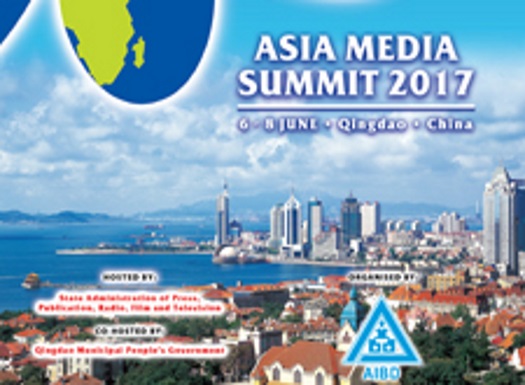Asia-Pacific Institute for Broadcasting Development (AIBD) in collaboration with its partners is organising the Asia Media Summit (AMS) in Qingdao, China, from June 6 to 8.
The conference provides a unique opportunity for broadcasters in the region to share their thoughts on broadcasting and information.
Decision makers, media professionals, scholars, and stakeholders of news and programming from Asia, Pacific, Africa, Europe, Middle East and North America attend this annual conference.
The conference will also hold a few pre-summit activities including a workshop on June 5, organised in association with Radiodays Europe.
Titled ‘A Sound Future – Creating Engaging Content on all Platforms (Radio)’, the aim of the workshop is to help broadcasters to better understand current challenges and competition for radio and highlight new ways of creating engaging audio content, relevant for its audiences. It will show how broadcasters can engage listeners and citizens in providing compelling content and how engagement can build loyal listeners. In addition, the workshop will explain the best ways for broadcasters to expand their content and brands on all platforms. The workshop will have also give an overview of the newest trends in successful radio formats in Asia-Pacific and in Europe.
This year’s conference will focus on the role of Media on the Frontline of Global Development.
One of the sessions of day one is ‘How Media can Shape the Development Agenda’. While a tremendous amount of development work is going on that affects the lives of millions of people, yet much of the public are unaware or uninformed of the work that is being done and the dynamics of these issues. This session will address how should the media step up and make sure that this information can be pertinent and engaging to all?
Another session titled ‘Media Responsibility and Global Issues: Activism or Neutrality?’ will discuss if the goal of broadcasters should be to merely supply information about societal and national events in a neutral fashion, or must they be active in ensuring the progress and execution of these goals in their different country contexts?
On day two, a session on 'Media for No Poverty: Creating Public Awareness and Engagement’ will look at how can media cover the topic of poverty with stories focusing on humanity and compassion towards those less privileged? How can statistics and data on poverty afflicting countries be communicated to effectively connect poverty with public opinion?
Some of the other sessions are ‘Reporting on Peace and Conflict: Have the rules changed?’, ‘Climate Change and Disaster Risk’, ‘Strategies for High-Quality Programming: Concepts, Content and Formats’ and ‘Trending Technology’.
The event will also feature the launch of a book featuring a research undertaken with IPPTAR, Radio Television Malaysia's Training Institute and Taylor's University, Malaysia.
The research, titled ‘The Role of Broadcasting Media in Communication for Development’, focuses on media's production and dissemination of development programmes via the various media platforms.
This study seeks to answer two questions: What do AIBD members think about the role of the media in relation to (global) (sustainable) development? What do AIBD members do in their coverage of development (issues/goals)?
According to the AIBD respondents, the near future will see an increase in resources and content, a sign of their continued commitment to communication for development. However, these ambitions will require supportive and consistent government policies, external financial resources – especially a concern among the private media organisations – and staff training and development, also with a view to improving the overall quality.

